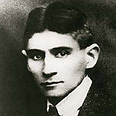
The long-awaited inventory, obtained by Reuters, details contents of safes in Tel Aviv and Zurich. It was submitted on Thursday to a family court in Tel Aviv where a legal battle is being waged over ownership of Max Brod's estate.
Kafka's "The Trial", "The Castle" and "Amerika" were published after his death when Brod, his close friend and biographer, ignored the writer's dying wish to burn all unpublished work.
In 1939 Brod fled the Nazis, taking the last train out of Prague with a suitcase of Kafka papers under his arm. After his death his estate was passed to his secretary Esther Hoffe, who placed some of the archive in Tel Aviv and Zurich safes.
The literary trove includes manuscripts of "Wedding Preparations in the Country" and other short stories, some Kafka diaries and correspondence, and Brod's unpublished diaries.
Ritchie Robertson, professor of German at Oxford University is eager to see the Kafka papers, but says Brod's own writings were the real subject of interest.
"Potentially the most interesting item is Max Brod's own diaries...used for his own biography of Kafka, in which he quoted numerous passages about Kafka from his diaries. But there may be more," Robertson told Reuters in an e-mail.
The trial
The fight for ownership is a tortuous legal battle inevitably described as Kafkaesque. On the one side stands Israel's National Library, on the other the daughters of Esther Hoffe, rumored to have had a romantic relationship with Brod.
Court sessions are held at the end of a low, dark corridor in a room barely big enough for the 10 lawyers involved. Hours of labyrinthine arguments this month dealt only with procedure. Lawyers twice asked what exactly the deliberation was all about.
Brod gave most papers to Kafka's niece by sending them to a Swiss bank in the 1950s. They ended up in Oxford after a chance meeting between an English academic and the niece's son.
In 1968 Brod died in Israel. His will instructed Hoffe to ensure his estate be preserved at Jerusalem's National Library, or the Tel Aviv Municipal Library, or any other public archive in Israel or abroad – leaving room for interpretation.
Scholars say Hoffe defied Brod's wishes to make his archive available to researchers, putting the papers out of reach. In 1988 she reportedly made millions by auctioning the manuscript of The Trial, which ended up at the German Literature Archive.
Hoffe died in 2007 at age 101, bequeathing the remaining papers to her daughters who hope to sell some. But Israel's National Library contests the will, claiming all of Brod's estate and Kafka as a cultural asset of the Jewish people.
Aviad Stollman, the library's Judaica Collection Curator, says Brod, an avid Zionist, would certainly not want to see his most prized possessions sold to an archive in Germany.
"Max Brod wanted his estate to end up here at the library. The natural place for it is here along with the archives of his fellow writers and friends from the Prague circle," he said.
Hoffe's daughter Eva declined comment. Her lawyer, Avigdor Feldman, said she wants the writings preserved under the best preservation conditions, at the German Literary Archive.
"Brod believed in post-war Germany which he visited many times," Feldman pointed out. "As to Kafka - he may have been Jewish but he was no Zionist."
- Follow Ynetnews on Facebook















